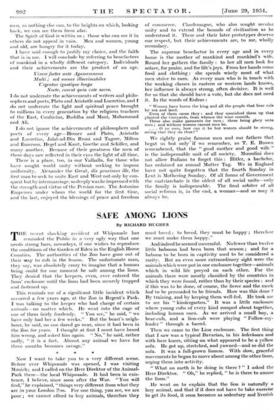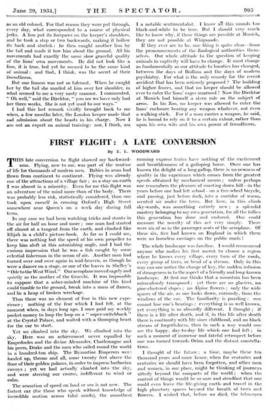SAFE AMONG LIONS
By RICHARD HUGHES
THE recent shocking accident at Whipsnade has reminded the Public in a very ugly way that one needs strong bars, nowadays, if one wishes to reproduce the conditions of the Garden of Eden in the English Home Counties. The authorities of the Zoo have gone out of their way to rub in the lesson. The unfortunate man, they say, was absolutely crazy to imagine that a human being could for one moment be safe among the lions. They denied that the keepers, even, ever entered the lions' enclosure until the lions had been securely trapped and fastened up.
This reminds me of a significant little incident which occurred a few years ago, at the Zoo in Regent's Park. I was talking to the keeper who had charge of certain animals—no matter which. He went into the cage of one of them fairly fearlessly. " You see," he said, " we have only had her a few weeks." But the beast's neigh7 hour, he said, no one dared go near, since it had been in the Zoo for years. I thought at first I must have heard him wrong, and asked him again. " No," he said, rather sadly, " it is a fact. Almost, any animal we have for three months becomes savage."
Now I want to take you to a very different scene. Before ever Whipsnade was opened, I was visiting Munich; and I called on the Herr Direktor of the Animal- Park there—the local Whipsnade. It had been in exis- tence, I believe, since soon after the War. "You will find," he explained, "things very different from what they are in .your. London ZOO. For one thing, you see, we are poor ; we cannot afford to buy animals, therefore they must breed ; to breed, they must be happy ; therefore we must make them happy."
And indeed he seemed successful. No fewer than twelve little baboons had been born that season ; and for a baboon to be born in captivity used to be considered a rarity. But an even more extraordinary sight were: the animals which were put in one enclosure together—animals which in wild life preyed on each other. For the animals there were mostly classified by the countries in which they were found, rather than by their species : and if this was to be done, of course, the fierce and the meek had to be persuaded to be friends. How was this done .? By training, and by keeping them well-fed. He took me to see his " kindergarten." It was a little enclosure where young cubs of every kind romped about together, including human ones. As we arrived a small boy, a bear-cub, and a lion-cub were playing " Follow-my- leader " through a barrel.
. Then we came to the Lion enclosure. The first thing that I saw was a typical Bavarian, in his lederhosen and with bare knees, sitting on what appeared to be a yellow sofa. He got up, stretched, and yawned—and so did the sofa. It was a full-grown lioness. With slow, graceful movements he began to move about among the other lions, urging them into activity.
" What on earth is he doing in there ? " I asked the Herr Direktor. " Oh," he replied, " he is there to amuse the lions."
He went on to explain that the lion is naturally a lazy animal, and that if it does not have to take exercise to get its food, it soon becomes as sedentary and liverish as an old colonel. For that reason they were put through, every day, what corresponded to a course of physical jerks. A lion put its forepaws on the keeper's shoulders, and he took a step or two backwards, making it hollow its back and stretch : he then caught another lion by the tail and made it tow him about the ground. All his movements had exactly the same slow graceful quality of the lions' own movements. He did not look like a lion, it is true, but yet he seemed to be the same kind of animal : and that, I think, was the secret of their friendliness.
But one lioness was not so tolerant. When he caught her by the tail she snarled . at him over her shoulder, in what seemed to me a very nasty manner. I commented, " Oh well," said the Direktor, " you see we have only had her three weeks. She is not yet used to our ways."
I had this last remark vividly brought back to me when, a few months later, the London keeper made that sad admission about the beasts in his charge. Now I am not an expert on animal training: nor, I think, am I a notable sentimentalist. I know all this sounds too black-and-white to be true. But I should very much like to know why, if these things are possible at Munich, they are not possible at Whipsnade.
If they ever are to be, one thing is quite clear—from the pronouncements of the Zoological authorities them- selves. Our whole attitude to the question of keeping animals in captivity will have to change. It must change as fundamentally as our attitude to lunatics has changed, between the days of Bedlam and the days of modern psychiatry. For what is the only remedy for the recent accident that has been seriously proposed ? The building of higher fences, and that no keeper should be allowed ever to enter the lions' cages unarmed ! Now the Direktor at Munich had himself a stern rule on the subject of arms. In his Zoo, no keeper was allowed to enter the lions' enclosure bearing any weapon whatever, not even a walking stick. For if a man carries a weapon, he said, he is bound to rely on it to a certain extent, rather than upon his own wits and his own power of friendliness.





































 Previous page
Previous page